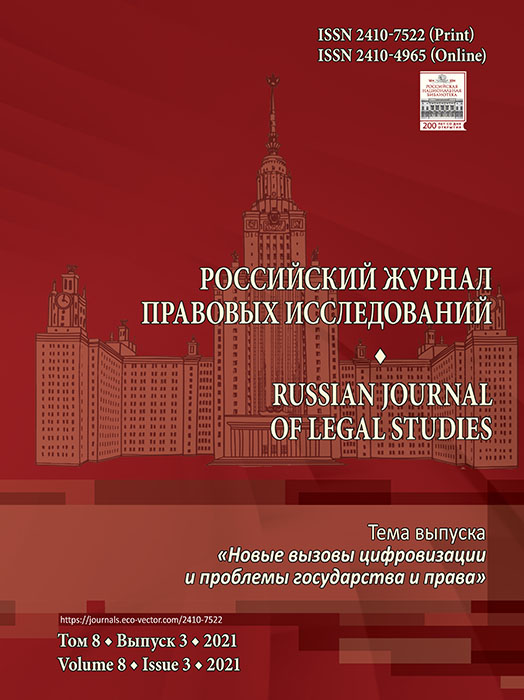The Right to Be Forgotten: The Balance Between Public and Private Interests in the Practice of Constitutional Control Organs
- 作者: Petrova D.A.1, Galchun E.A.1
-
隶属关系:
- Far Eastern Federal University
- 期: 卷 8, 编号 3 (2021)
- 页面: 41-48
- 栏目: Theory and history of state and law
- ##submission.dateSubmitted##: 27.08.2021
- ##submission.dateAccepted##: 06.09.2021
- ##submission.datePublished##: 07.10.2021
- URL: https://journals.eco-vector.com/2410-7522/article/view/79225
- DOI: https://doi.org/10.17816/RJLS79225
- ID: 79225
如何引用文章
详细
The internet information and telecommunications network, due to its accessibility and easy storage and distribution of huge amounts of data, and its ability to search and find information, plays a key role in the implementation of such fundamental rights as freedom of speech and the press. At the same time, there is an increasing risk that materials on the World Wide Web may harm the rights and legitimate interests of individuals, especially the right to privacy. In these conditions of eternal competition between the public and the private, the right to be forgotten arises as a mechanism that allows one to remove or slow the spread of unwanted information. The authors investigate the problem of implementing this relatively new opportunity in the context of finding a balance between the public interest in obtaining information and the private interest in destroying it. It is argued that this category of cases is difficult due to the lack of a unified standard of proof and criteria for evaluating arguments. Based on an analysis of the most important precedents, the most common legal positions on the issue are identified and critically assessed. An increasing priority afforded to public interest and the decreasing requirements for the deletion of information is revealed. The authors consider the emergence of the right to be forgotten as a new mechanism for settling disputes in a pre-trial manner, by allowing one to not completely destroy, but to suspend the dissemination of undesirable information, thereby protecting private interests without violating the legitimate rights of the public. The conclusion is made about the right to be forgotten as a compromise in the conflict of fundamental rights. An approximate list of arguments for applicants and respondents is provided, suitable for practical application in disputes about the right to be forgotten.
全文:
作者简介
Daria Petrova
Far Eastern Federal University
编辑信件的主要联系方式.
Email: petrova.dan@dvfu.ru
candidate of political sciences, associate professor
俄罗斯联邦, VladivostokEkaterina Galchun
Far Eastern Federal University
Email: galchun.ea@students.dvfu.ru
student
俄罗斯联邦, Vladivostok参考
- Loginova TD. “The right to be forgotten” as a way to ensure the information security of the individual. Modern problems of ensuring the rule of law and human rights. 2018;18-2:225–226. (In Russ.).
- Chebotareva AA. Development of law enforcement practice in the field of legal support of information security of the individual (on the example of the implementation of the “right be forgotten”). Successes of modern science and education. 2016;11(4):97–100. (In Russ.).
补充文件






